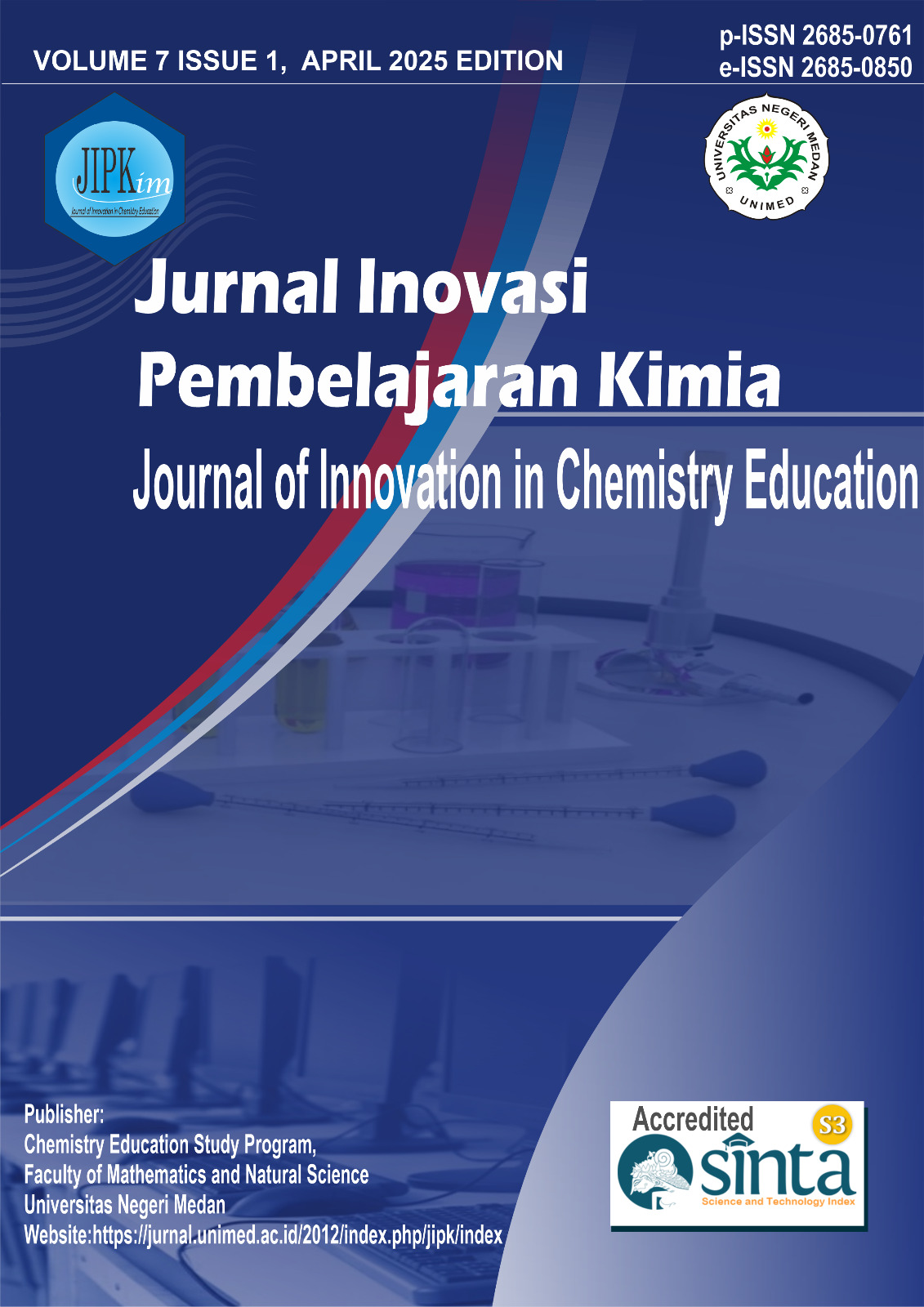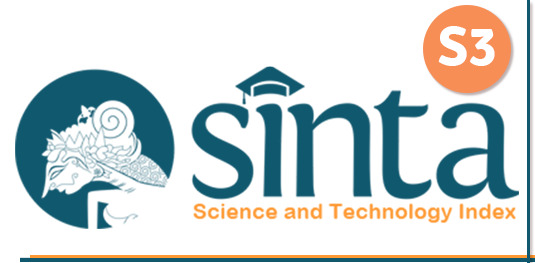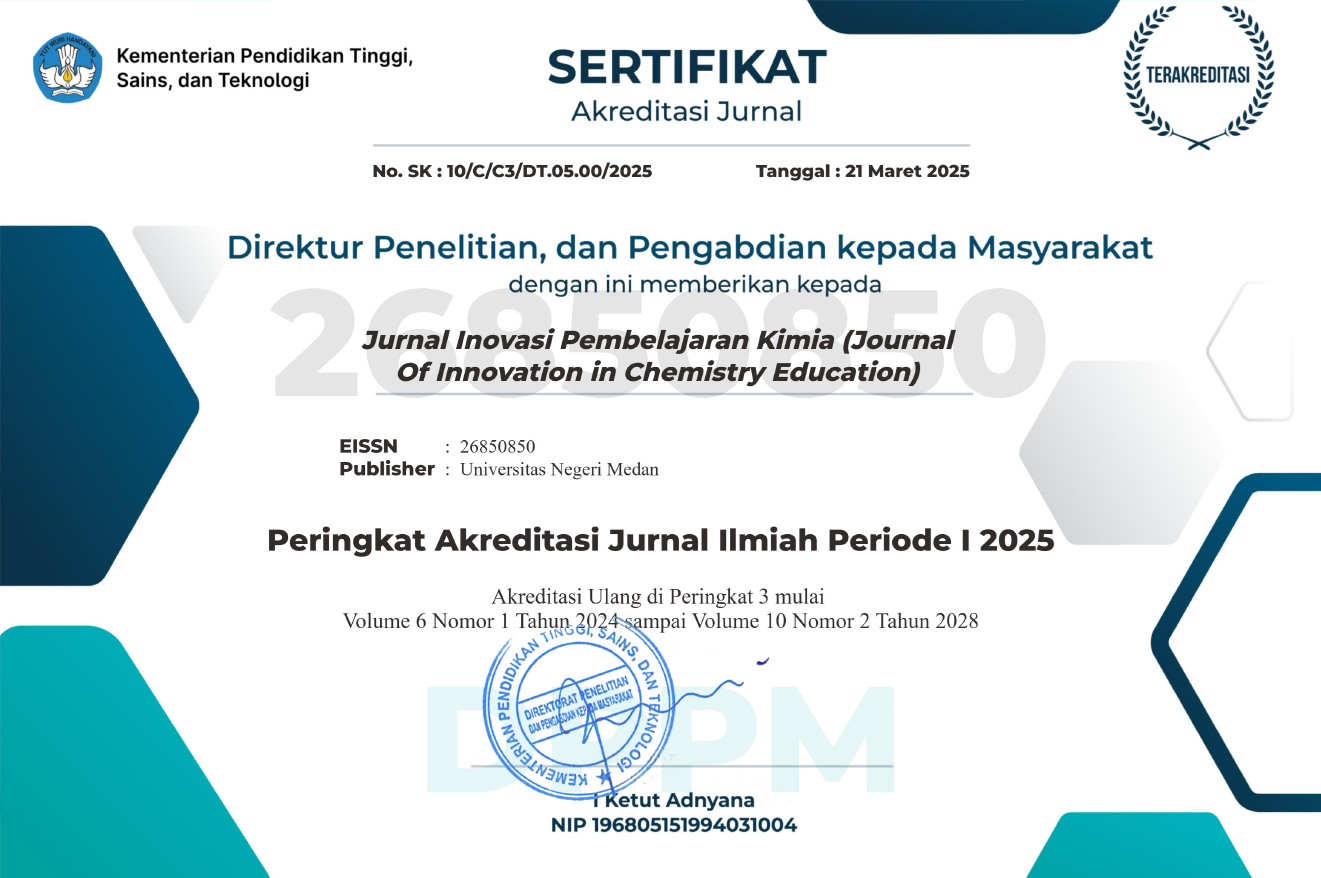Design of E-Assessment for Creative Thinking in Project-Based Learning on Colligative Properties of Solutions
DOI:
https://doi.org/10.24114/jipk.v7i1.67221Keywords:
creative thinking, e-assessment, project-based learningAbstract
Assessment is an important part of the learning process in chemistry education, which requires conceptual understanding and creative thinking skills. However, traditional assessment often fails to accommodate the needs of 21st-century learning, which requires the integration of technology, creativity, and problem solving. This study aims to determine: (1) the characteristics of eAssessment, (2) the feasibility of e-Assessment on teacher usability tests, and (3) the student responses to e-Assessment on student readability tests. This study employed a Design-Based Research model. In this study, a product trial was conducted with 10 high school chemistry teachersand 36 grade XII high school students. Data analysis techniques used descriptive qualitative and quantitative methods to determine product quality based on ideal assessment criteria. Based on teacher evaluations, the product was rated very high, with average scores for content (22.70 out of 25.00), presentation (23.00 out of 25.00), usability (27.60 out of 30.00), and project learning (22.70 out of 25.00). Based on student readability, the scores were very high, with average scores for presentation (22.11 out of 25.00), language (9.11 out of 10.00), and attractiveness (16.78 out of 20.00). Thus, the developed e-Assessment system is deemed suitable for use by teachers as a student assessment system.References
Asy'ari, M., Ikhsan, M., & Muhali. (2019). The effectiveness of inquiry learning model in improving prospective teachers' metacognition knowledge and metacognition awareness. International Journal of Instruction, 12(2), 455-470. https://doi.org/10.29333/iji.2019.12229a.
Asy'Ari, M., Prayogi, S., Mirawati, B.,. (2021). Development of physics learning tools based on inquiry to increase creative thinking skills. Journal of Physics: Conference Series, 1816(1). https://doi.org/10.1088/1742- 6596/1816/1/012094.
Biazus, M. de O., & Mahtari, S. (2022). The Impact of Project-Based Learning (PjBL) Model on Secondary Students' Creative Thinking Skills. International Journal of Essential Competencies in Education, 1(1), 38-48. https://doi.org/10.36312/ijece.v1i1.752.
Chanpet, P., Chomsuwan, K. & Murphy, E. Online Project-Based Learning and Formative Assessment. Tech Know Learn 25, 685–705 (2020). https://doi.org/10.1007/s10758-018-9363-2
Divjak, B., Žugec, P., & Pažur Aničić, K. (2022). E-assessment in mathematics in higher education: a student perspective. International Journal of Mathematical Education in Science and Technology, 1-23. https://doi.org/10.1080/0020739X.20 22.2117659.
Ernawati, M., Muhammad, D., Asrial, A., & Muhaimin, M. (2019). Development of creative thinking skill instruments for chemistry student teachers in Indonesia. International Journal of Online and Biomedical Engineering, 15(14), 21-30. https://doi.org/10.3991/ijoe.v15i14.11354.
Grossman, P., Dean, C. G. P., Kavanagh, S. S., & Herrmann, Z. (2019). Preparing teachers for project-based teaching. Phi Delta Kappan, 100(7), 43-48.https://doi.org/10.1177/0031721719841338.
Hodijah, E. S.. (2022). Development of ESDbased virtual field trip mobile learning application. http://repository.upi.edu/.
Julianto, I. R., & Nuryatin, A. (2022). Integration of character education based on digital learning in Indonesian language subjects. Proceedings of the National Seminar on Language, Literature, Arts, and Basic Education (SENSASEDA), 2, 25-30.
Kahfi, A. (2022). Implementation of pancasila student profile and implications for student character at school. http://repository.upi.edu/
Karmila, A., Arief, N. A. R., Friska, S., & Astuti, L. (2022). Development of ELearning Chemistry Based on Project Based Learning on Buffer Solution Using Then Flipped Classroom Approach in Class XI SMA/MA. International Journal Of High Information, Computerisation, Engineering And Applied Science (JHICE), 2(01), 19-27. https://doi.org/10.24036/jhice/vol2-iss1/35.
Nainggolan, B. (2019). Pengembangan Penuntun Praktikum Kimia Inovatif Terintegrasi Pembelajaran Berbasis Proyek dan Karakter Pada Materi Koloid. Jurnal Inovasi Pembelajaran Kimia (Journal of Innovation in Chemistry Education), 1(2), 50-57. https://doi.org/10.24114/jipk.v1i2.14760.
Permana S. R., Paulina, H. M., Oktaviani, C., Yakob, M., & Nazar, M. (2023). Development of Electronic Learning Chemistry Assessment Applications Through Project-Based Learning for
Increasing Student Scientific Performance. Indonesian Journal of Science Education, 11(1), 191-205.
https://doi.org/10.24815/jpsi.v10i4.27984
Permatasari, S. C., & Ekohariadi. (2023). Pengembangan Media Pembelajaran Berbasis Website Interaktif Menggunakan Laravel Untuk Meningkatkan Kompetensi Belajar Mata Pelajaran Basis Data Siswa Kelas Xi Rpl Di Smkn 1 Surabaya. ITEdu: Jurnal Information Technology and Education, 8(2), 168-180. https://doi.org/10.26740/itedu.v8i2.56278.
Purba, J. & Fitri, R., A. (2021). Pengembangan Bahan Ajar Kimia Berbasis Proyek dengan Multimedia
Pada Materi Alkena di Sekolah Menengah Atas. Jurnal Inovasi Pembelajaran Kimia (Journal of
Innovation in Chemistry Education), 1(3), 56-65. https://doi.org/10.24114/jipk.v3i1.23536.
Rahardjanto, A., Husamah, & Fauzi, A. (2019). Hybrid-PjBL: Learning outcomes, creative thinking skills, and learning motivation of preservice teachers. International Journal of Instruction, 12(2), 179-192. https://doi.org/10.29333/iji.2019.12212a
Sulastri, S., Syahril, S., Adi, N., & Ermita, E. (2022). Strengthening character education through the Pancasila student profile for teachers in elementary schools. JRTI (Journal of Indonesian Action Research), 7(3), 583. https://doi.org/10.29210/30032075000
Yamin, Y., Permanasari, A., Redjeki, S., & Sopandi, W. (2020). Project based learning to enhance creative thinking skills of the non-science students. In JHSS (Journal of Humanities and Social Studies) (Vol. 04). https://doi.org/10.22219/jpbi.v6i2.12202.
Zahroh, F. (2020). The effect of project-based learning model on students' critical thinking skills in electrochemistry. Jurnal Phenomenon. 10(2), 191-203. https://doi.org/10.21580/phen.2020.10.2.4283.













